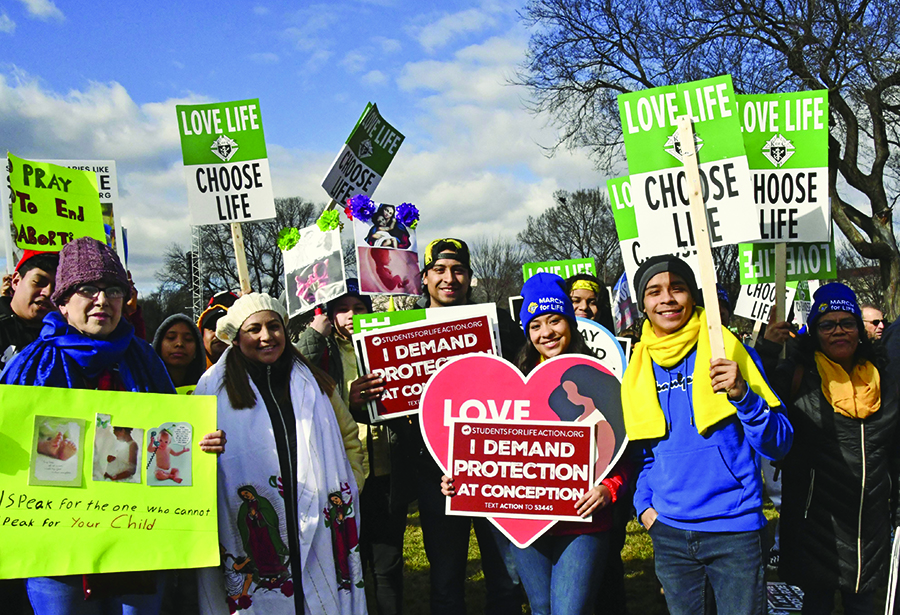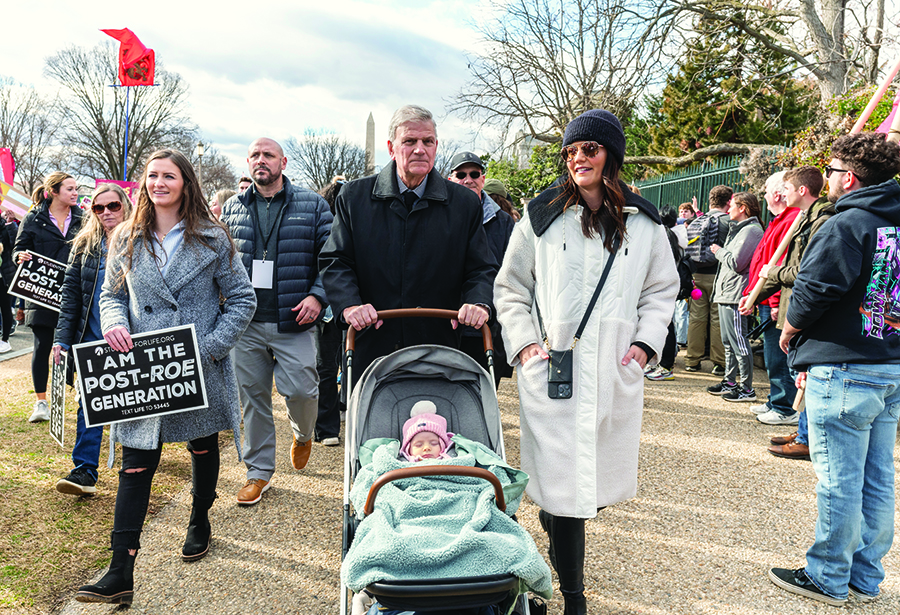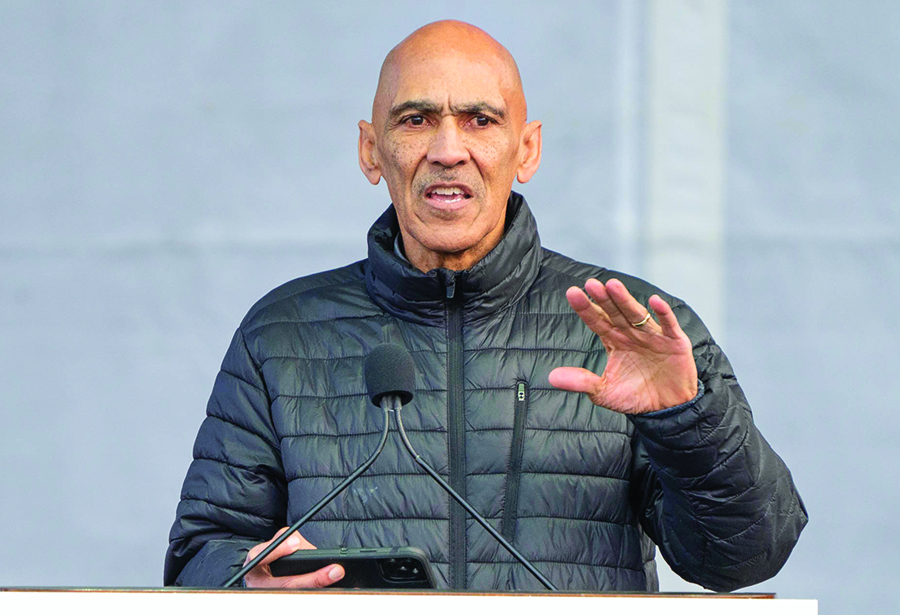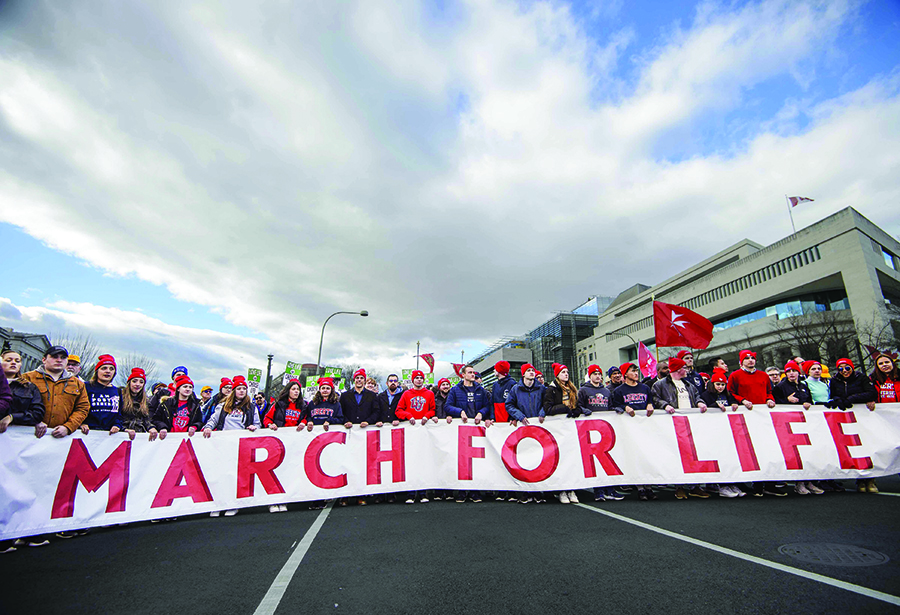In October 1973, a group of pro-life leaders gathered in Nellie Gray’s home in Washington, D.C., to decide how to observe the first anniversary of Roe v. Wade, the Supreme Court decision that legalized abortion on demand nationwide.
The result? A peaceful protest by 20,000 people at the National March for Life on Jan. 22, 1974, and shortly thereafter, a solid determination to continue the march each year until Roe v. Wade was overturned.
Five decades—and 63 million destroyed lives later—tens of thousands of marchers descended on the National Mall to celebrate the June 24 Dobbs Supreme Court decision that finally overturned the egregious 1973 ruling and handed control of abortion back to the states.
“So many giants paved the way for this momentous victory,” said Jeanne Mancini, March for Life president, “including our own Nellie Gray, the [late] founder of the March for Life, whose birthday was on June 24. I can’t think of a better birthday gift.”
But Mancini gave the most credit to the massive crowd standing shoulder to shoulder in front of her, as far back as her eyes could see, who had come from almost every state in the nation, and even a small film crew from Canada, who are hoping for the same victory in their country someday.
“I truly believe in my heart that every single one of you also led the way to the overturn of Roe v. Wade,” Mancini said. “Your public, peaceful witness to the inherent dignity of the unborn child every year here at the March for Life led the way to that momentous decision.”
Leading up to this year’s march, on Jan. 22, Mancini was frequently asked if the event would go forward.

“While this year marks our most significant victory, the human rights abuse of abortion is far from over,” she said. “Sadly, this year alone in the United States, there will be well over 700,000 abortions, and we know that in every abortion, one life is taken and at least one life is wounded. And so we will continue to march. We will continue to march until the human rights abuse of abortion is a thing of the past. We will march until abortion is unthinkable.”
Although the overturn of Roe has opened the door for states to enact laws protecting the unborn, there have already been new federal challenges. Since the Mississippi Dobbs v. Jackson Women’s Health Organization case was decided, there have been legislative efforts to codify a “right to abortion” through all nine months of pregnancy into federal law, something that would nullify many hard-won state protections for women and unborn children.
Pro-life leaders in this new post-Roe era want to establish a culture of life in America. What that calls for is a continued presence in Washington; individual state marches—10 are already planned for this year; and increased support for pregnant women in need.

Photo: Shealah Craighead/©2023 Samaritan’s Purse
“Until we can give women, when they are the most vulnerable, what they need and what their children need to thrive,” said Mississippi Attorney General Lynn Fitch, “until we can make changes in our laws that reflect our compassion for all life, and until we can change hearts and minds in our fellow Americans—until then, life remains fragile, and the embrace of human dignity remains aspirational.”
The new pro-life majority in the U.S. House of Representatives is off to a great start, Mancini said, noting the passage of the Born-Alive Abortion Survivors Protection Act, which says a baby born alive outside the womb cannot be aborted. And there’s hope for the No Taxpayer Funding for Abortion Act, which was introduced in 2021 by Rep. Chris Smith (R-NJ), co-chair of the Congressional Pro-Life Caucus.
But a culture of life in America will require more than legislation, said NFL Hall of Famer Tony Dungy. It will require an outpouring of prayer, much like what happened after Buffalo Bills safety Damar Hamlin suffered cardiac arrest during a televised football game on Jan. 2.
“An unbelievable thing happened that night,” Dungy said. “A professional game, with millions of dollars of ticket money and advertising money on the line, that game was canceled. Why?”
Because a life was at stake, and people wanted to see that life saved, he said.
“That should be encouraging to us, because that’s exactly why we’re here today. Because every day in this country, innocent lives are at stake. The only difference is, they don’t belong to a famous athlete, and they are not seen on national TV. But those lives are still important to God.”

Photo: John Harrington/©2023 Samaritan’s Purse
Franklin Graham offered a closing prayer for the rally, thanking God for President Donald Trump and Vice-President Mike Pence for nominating judges who believed in the sanctity of life. And for Mitch McConnell and other senators who worked to get those judges confirmed.
As marchers began their route to the Capitol Building, Megan Petty, of Tampa, Florida, reflected on why the March for Life is personal for her.
“When I was 16, my mother forced me into an abortion that I did not want, and then after that I could not have children,” she said. “It’s been a lifetime of pain and suffering and regret.
“And so I come to the march in solidarity with women all over the country who regret their abortions. I want young women to understand that abortion is not the answer. I want them to do whatever they have to do to have their baby, even if they have to give it up for adoption.”
Stories like Petty’s are why the fight for life is so important to Lisa Eshleman, a marcher with the nonprofit group Generation Life.
“We want to end abortion, even as a decision for people,” Eshleman said. “We don’t want people to even consider it or think about it as an option. I’m personally from Maryland, and our organization is based out of Pennsylvania. Abortion continues to be legal in both of those states, and of course here in D.C. and in Virginia as well. And, so, until no more abortions occur in the United States and in the world entirely, we’ll continue to be here and to spread this message.”
America, at its core, is already a culture of life, said Hogan Gidley, of Columbia, South Carolina, who has attended the event for 20 years.
“If someone gets stuck in a well, if a coal mine collapses, we cling to the fact that someone is under that rubble, someone is alive,” he said. “When a building collapses in Florida, we pray for those who are suffering, who could be trapped. It’s in our nature.”
This monumental year was the first March for Life event for Connor O’Rourke and 11 of his friends from Summit Ministries, an apologetics organization focused on college students.
“Life begins at conception,” said O’Rourke, of Andalusia, Alabama. “People are made in the image of God, and because of that value we have as human beings, when there’s an atrocity like this being committed where millions upon millions of people are being killed without the ability to defend themselves, someone needs to defend them, and that’s what we are trying to do today.”
Groups of young people from various churches and schools were well represented among the thousands at
the march.
“A lot of girls in my family have had abortions,” said a Liberty University student named Maddie. “They’ve had a lot of pain that could have been avoided, and now they need healing. I’m marching for them.”
Franklin Graham remembered women who’ve had abortions in his closing rally prayer.
“Father, we come to pray for the millions of women, who feel that they have no hope, that they’re condemned because they had an abortion. Father, my prayer is for these millions of women, that they will come to know that You love them and care for them and that You will forgive them of their sins if they would repent and believe on the Name of Your Son, Jesus Christ.”
He also thanked God for the thousands who have come to the march for the last 50 years, “who’ve stood in the rain, the snow, the wind, the cold, to take a stand for life.”
It was only the fourth march for Christine Roma, of Georgia, but she could feel the difference this year.
“There’s a zeal and a joy, and it feels very powerful this time,” she said. “It’s like people are waking up to the truth, that life is precious and that we need to act upon that and not be afraid.” ©2023 BGEA

Photo: John Harrington/©2023 Samaritan’s Purse
